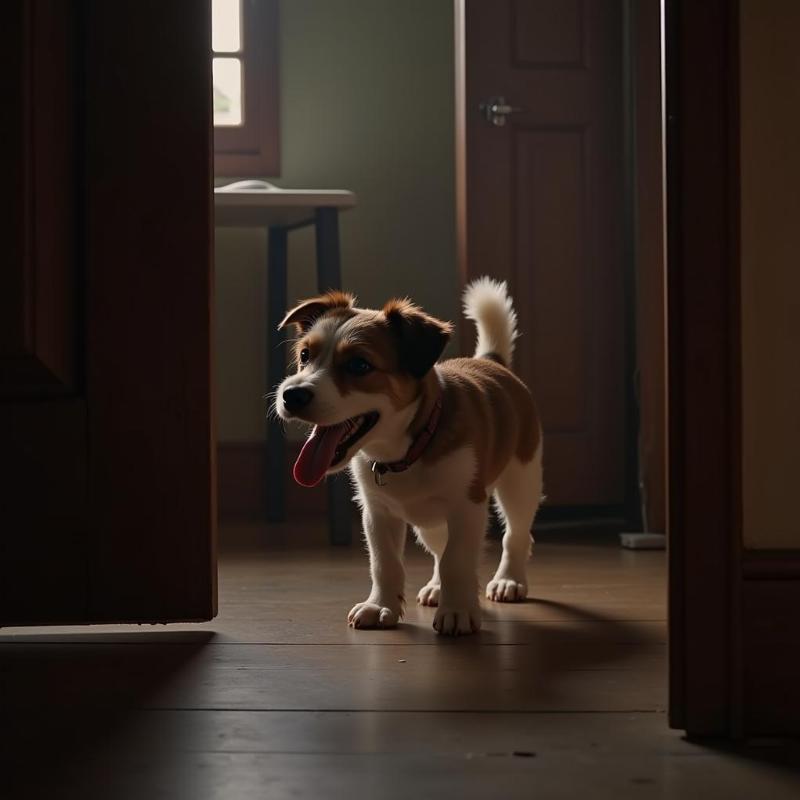If you’ve ever woken up to the sound of your dog panting at night, you’re not alone. Many dog owners in the US experience this and wonder, “why does my dog pant at night?” While panting is a normal way for dogs to regulate their body temperature, excessive or unusual panting at night can be a sign of something more. This article will explore the common reasons why dogs pant at night, when it’s time to worry, and how to ensure your furry friend gets a good night’s sleep.
Common Reasons for Nighttime Panting
Several factors can contribute to your dog’s nighttime panting. Understanding these can help you determine whether it’s a simple fix or a sign of a larger issue.
Temperature and Environment
Dogs don’t sweat like humans; they pant to cool down. If your home is too warm, especially during summer nights, your dog might pant to regulate their body temperature. Consider using a fan, air conditioning, or providing a cooling mat for your dog. Humidity can also play a role, making it harder for dogs to cool down efficiently.
Anxiety or Stress
Just like people, dogs can experience anxiety and stress. Nighttime can be especially challenging for anxious dogs, leading to panting, pacing, and whining. Changes in routine, loud noises, or even separation anxiety can trigger this behavior. A comforting routine, calming music, or a thunder shirt might help ease their anxiety.
Pain or Discomfort
Panting can be a sign of pain or discomfort. If your dog is experiencing arthritis, an injury, or any other medical condition, they may pant more at night when they’re less distracted by activity. Observe your dog for other signs of pain, such as limping, whimpering, or changes in appetite.
Obesity
Overweight dogs are more prone to panting, as carrying extra weight makes it harder for them to regulate their body temperature and breathe comfortably, especially when lying down. Maintaining a healthy weight for your dog through proper diet and exercise is crucial.
Underlying Medical Conditions
Certain medical conditions, such as heart or respiratory problems, can cause increased panting. Cushing’s disease, a hormonal disorder, can also lead to excessive panting. If your dog’s panting is persistent or accompanied by other symptoms like coughing, lethargy, or changes in eating habits, consult a veterinarian immediately.
When to Worry About Your Dog Panting at Night
While occasional panting is normal, there are instances when it warrants concern. why does my dog pant so much at night If your dog’s panting is sudden, severe, or accompanied by other symptoms like pale gums, collapsing, or difficulty breathing, seek emergency veterinary care. These could be signs of heatstroke, a life-threatening condition.
 Dog panting at night due to anxiety
Dog panting at night due to anxiety
Creating a Comfortable Sleeping Environment for Your Dog
Ensuring a comfortable sleeping environment can significantly reduce nighttime panting. Keep the room at a cool temperature, provide fresh water, and offer a comfortable bed. A calming routine before bed, such as a short walk or gentle massage, can also help.
Is it Normal for My Senior Dog to Pant More at Night?
Senior dogs may pant more due to age-related changes like arthritis or decreased heart function. why does my dog start panting at night Regular veterinary checkups are crucial for senior dogs to monitor their health and address any underlying conditions.
Conclusion
Understanding why your dog pants at night is crucial for ensuring their well-being. By addressing potential causes like temperature, anxiety, or underlying medical conditions, you can help your furry friend sleep soundly. Remember, if you’re ever concerned about your dog’s panting, consulting a veterinarian is always the best course of action. why does dogs pant at night
FAQ
- Why is my dog panting heavily at night? Heavy panting can be due to heat, anxiety, pain, or a medical condition.
- Is it normal for dogs to pant a little while sleeping? Some panting during sleep is normal, especially in warmer temperatures.
- When should I be concerned about my dog’s panting? If the panting is sudden, severe, or accompanied by other symptoms, seek veterinary care.
- How can I help my dog stop panting at night? Ensure a cool environment, address anxiety, and consult a vet for any medical concerns.
- What medical conditions can cause panting in dogs? Heart problems, respiratory issues, Cushing’s disease, and pain can all cause panting.
- Can obesity cause panting in dogs? Yes, overweight dogs are more prone to panting.
- Does anxiety cause panting in dogs at night? Yes, anxiety and stress can be a major contributor to nighttime panting.
Beautdogs.us is your premier resource for all things dog-related in the US. We offer expert advice on dog breeds, care, and product recommendations to help you provide the best possible life for your canine companion. Whether you’re a new dog owner or a seasoned pro, Beautdogs.us is your trusted source for comprehensive and engaging information on dog care and companionship. Contact us today for all your dog-related queries! Email: [email protected], Phone: +1 501-555-7529.